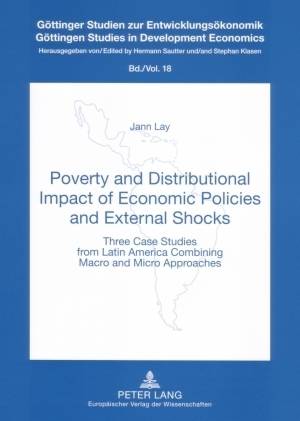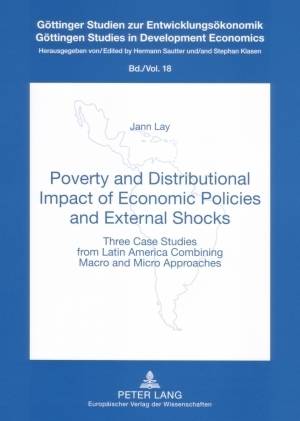
- Afhalen na 1 uur in een winkel met voorraad
- Gratis thuislevering in België vanaf € 30
- Ruim aanbod met 7 miljoen producten
- Afhalen na 1 uur in een winkel met voorraad
- Gratis thuislevering in België vanaf € 30
- Ruim aanbod met 7 miljoen producten
Zoeken
Poverty and Distributional Impact of Economic Policies and External Shocks
Three Case Studies from Latin America Combining Macro and Micro Approaches
Jann Lay
€ 68,45
+ 136 punten
Omschrijving
Economists have had much to say about the impact of economic policies on growth, but little on their distributional consequences and poverty impact. The reorientation of development policy from structural adjustment to poverty reduction as the central objective thus called for new tools to examine distributional change. This book analyzes the poverty and distributional impact of policy changes and external shocks in three case studies from Latin America: Trade liberalization in Colombia and Brazil, and the gas boom in Bolivia. It uses an innovative approach that combines computable general equilibrium and microsimulation models. The country applications illustrate that distributional consequences depend very much on the nature of the shock or policy change as well as the characteristics of the country in question. The book issues a warning against policy prescriptions being based on oversimplifying assumptions and models.
Specificaties
Betrokkenen
- Auteur(s):
- Uitgeverij:
Inhoud
- Aantal bladzijden:
- 154
- Taal:
- Engels
- Reeks:
- Reeksnummer:
- nr. 18
Eigenschappen
- Productcode (EAN):
- 9783631565599
- Verschijningsdatum:
- 12/04/2007
- Uitvoering:
- Paperback
- Formaat:
- Trade paperback (VS)
- Afmetingen:
- 148 mm x 210 mm
- Gewicht:
- 210 g

Alleen bij Standaard Boekhandel
+ 136 punten op je klantenkaart van Standaard Boekhandel
Beoordelingen
We publiceren alleen reviews die voldoen aan de voorwaarden voor reviews. Bekijk onze voorwaarden voor reviews.











